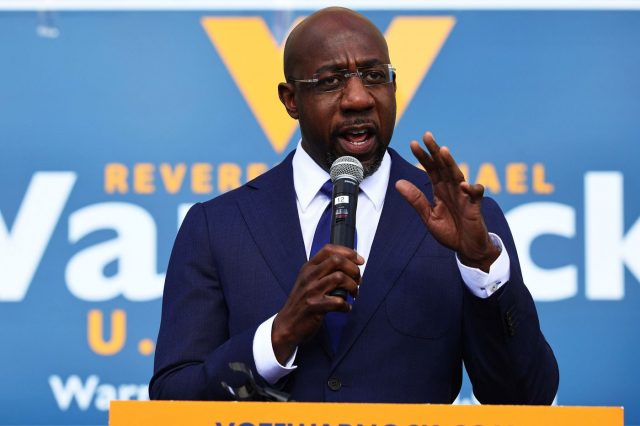By Carter Dewees
For The Birmingham Times
“The 82-year-old hands that used to pick someone else’s cotton went to the polls and picked her youngest son to be a United States Senator” – The Reverend Raphael Warnock, on his mother.
Last week, Democrats Jon Ossoff and The Reverend Raphael Warnock narrowly defeated Republicans David Perdue and Kelly Loeffler on Tuesday, January 5 to create a Democratic majority in the U.S. Senate and a Democratic Trifecta on the federal level, meaning they will have control of the House of Representatives, the Senate, and the Presidency, for the first time in a decade.
When each Senator-elect is seated, the Senate will be deadlocked in a 50-50 tie, with Vice President-elect Kamala Harris in position to cast the deciding vote on key legislation for the next two years.
“I know we can rebuild a fairer economy by respecting the dignity of work and the workers who do it. An economy that honors those whom we now call essential workers by paying them an essential wage, providing them essential benefits . . . To everyone out there struggling today—whether you voted for me or not—know this: I see you. I hear you. And I will fight for you. I will fight for your family,” said Warnock as the votes were tallied last week and he made history as the first Black Senator from Georgia, and the first Black Democratic Senator from the Deep South.
Typically, Democrats have trouble winning runoff elections in Georgia. Turnout is usually lower than general elections, and Republican voters tend to show up slightly more often than Democrats, handing the GOP an edge. However, this runoff was different. Hundreds of millions of dollars poured into Georgia as control of the Senate hung in the balance. Outside groups flocked to Georgia to tip the scales for Democrats, with groups like the Working Families Party hiring field organizers to mobilize Democratic voters. Significant investment was made in voter activation and registration as well.
The Architect
Stacey Abrams, the 2018 gubernatorial nominee in Georgia, founded the voter registration group Fair Fight Action in 2018 to address voter suppression and has been hailed as an architect of Democratic victories in Georgia. Abrams lost in 2018 in a tight race to Georgia governor Brian Kemp, but the competitive race demonstrated that Democrats could win Georgia under the right circumstances.
For much of 2020, the race to fill the retired Senator Johnny Isaakson’s seat in the special election was crowded and unclear. Because it was a special election, Georgia used the “Jungle Primary” system where no party holds primaries, and every candidate runs on the same ballot. The runoff could have been between two Republicans, two Democrats, or, as it came to be, one of each. While the race between Ossoff and Perdue was never expected to go to a runoff, the special election to fill Isaakson’s seat was anticipated to be decided by one all along.
Governor Brian Kemp appointed businesswoman Kelly Loeffler to fill the seat in January 2020, and she began her re-election campaign almost immediately. She bested then-congressman Doug Collins to become the top Republican vote-getter in the Nov. 3 election. Several Democrats jumped into the race in early 2020, but many feared that they could become “locked out” of the anticipated January runoff due to a crowded field of Democrats.
However, in September, former President Barack Obama endorsed Warnock to fill the seat, and Warnock immediately became a clear favorite to advance to the January runoff.
As a graduate of Morehouse college, the lead pastor of Ebenezer Baptist Church in Atlanta, and an activist for many years, Warnock communicated effectively to Georgian voters on issues like affordable health care, stimulus checks, and economic recovery. Conversely, Senator Loeffler spent much of her time accusing Warnock of being a “socialist,” repeating the phrase “radical liberal Raphael Warnock” to attempt to sway voters. Warnock invested heavily in Southwest Georgia, part of the black belt. He overperformed President-elect Joe Biden’s numbers in the region, aiding him in a close victory.
“I stand before you as a man who knows that the improbable journey that led me to this place in this historic moment in America could only happen here,” Warnock said last week, attributing his victory to positive messaging throughout his campaign.
The race to fill Georgia’s other senate seat was more conventional, with only three candidates appearing on the ballot in November. Sen. David Perdue received a plurality of votes cast but not a majority, setting up a rematch between Perdue and Jon Ossoff. David Perdue had served one term as a Senator, first elected in 2014. Ossoff began his political career as an aide to the late Civil Rights hero John Lewis. Ossoff ran in a highly contested special election in 2017, losing a race for Georgia’s 6th district in what was then the most expensive House race of all time. In what can be considered a remarkable political comeback, Ossoff went from losing a well-funded House race to becoming the youngest current U.S Senator at age 33.
Georgia Secretary of State Brad Raffensberger will have to certify the results of the runoff elections by January 22nd. The Senators-elect will likely be seated in late January, shortly after the inauguration of President-elect Biden on the 20th.
Digital-Focused Campaign
Democrats Warnock and Ossoff were successful after running a digital-focused campaign in an effort to reach out to young voters, a group that tends to vote Democratic, but votes at a lower rate than older voters. Their campaigns spent lots of time on social media reaching out to voters. Ossoff went viral on Tiktok, and Warnock live-streamed himself playing an online version of UNO on Twitch. These tactics have been pioneered by campaigns and politicians like Massachusetts Senator Ed Markey and Alexandria Ocasio-Cortez, Representative from New York’s 14th Congressional district and the investment paid off on Tuesday.
The importance of Black voters in Tuesday’s runoff election cannot be overlooked. Black voters delivered the victory to Democrats, flipped control of the Senate, and elected the first Black Democratic Senator from the deep south. Both campaigns invested heavily in outreach to Black voters.
The Covid-19 outbreak was also a major factor in both elections, as both Republican Senators have been accused of insider trading using intelligence about the outbreak in early 2020 to trade stocks and profit. Ossoff coined the phrase “Georgians got sick. Perdue got rich”, to condemn Perdue’s actions. However, all four candidates endorsed $2,000 stimulus checks due to extreme economic conditions caused by the coronavirus pandemic.
Looking ahead, the victory for Democrats means Chuck Schumer will become the Majority Leader and top Republican Mitch McConnell will become the Minority Leader. When President-elect Biden is inaugurated on January 20, Republicans will not be able to halt many of Biden’s plans. All eyes will be on moderate Senators like Joe Manchin (WV-D), Kyrsten Sinema (AZ-D), and Lisa Murkowski (AK-R), as their support will be treasured on each bill for the next two years in a potentially gridlocked Senate. Vice-President elect Kamala Harris will likely be spending a lot of time breaking ties in her former workplace.
With Biden already announcing plans for a COVID relief package exceeding one trillion dollars, some of Warnock and Ossoff’s first actions will likely be passing badly-needed pandemic relief. Their victories last Tuesday will empower the Biden administration to pass much of its agenda.





